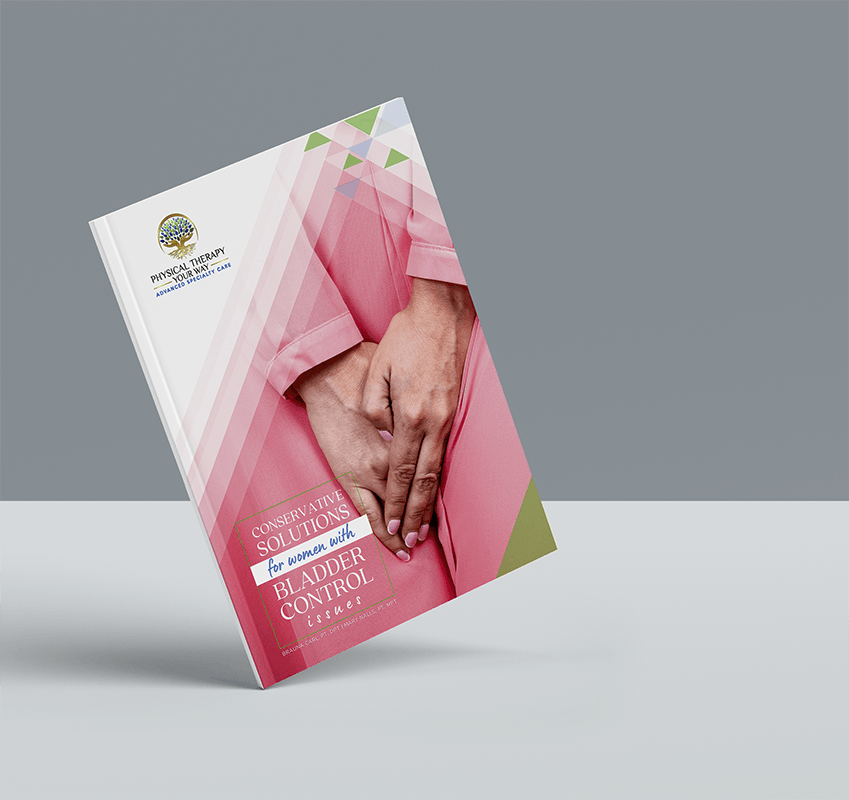Pelvic floor physical therapy may be the conservative solution to your pelvic floor issues! At Physical Therapy Your Way, we treat pelvic pain, sexual dysfunction, urinary or bowel problems, pelvic organ prolapse, and side effects from pregnancy, childbirth, menopause, or urogynecologic surgeries or cancers. Our therapists understand the physical and emotional toll these conditions cause and are here to help. We treat women of all ages and stages of life. Our specialists listen to you, provide a thorough screening, and coordinate care with other medical specialists to help you return to activities that are most important to you. Our compassionate, caring, and capable therapists are here to help you optimize your bladder, bowel, sexual, and daily function.
If you are unsure whether you need pelvic floor physical therapy, please use our online tool (Click here and take the Cozean Pelvic Floor Screening test), then request a free telephone consultation to go over your results.
Women's Pelvic Floor diagnoses we treat:
Pelvic Pain
Pelvic floor physical therapists successfully treat women with pain in and around the pelvis. This includes the lower abdomen, low back, groin, vagina, rectum, perineum, and tailbone.
We conduct a thorough examination to determine the sources of your pain. Pain may originate in the pelvic organs; scar or endometrial tissue; pelvic or spinal nerves; joints of the back, pelvis, and hips; or muscles of the back, hips, abdomen or pelvic floor. Once we determine the causes of your pain, we work with you to help you meet your goals. There are several common types of pelvic pain:
Levator Ani Syndrome or Non-Relaxing Pelvic Floor. The levator ani is the collective name for the group of muscles that forms the bottom, or the floor, of the pelvis. This group of muscles extends from the pubic bone in the front of the pelvis to the tailbone in the back. These muscles support the bladder, rectum and uterus. When these deep muscles become too tight or don't relax, they may pull the tailbone forward, causing pain in the rectum or coccyx that is often worse with sitting. Tightness in the levator ani muscles may also lead to difficulties with urination, defecation, and sex because all the pelvic orifices - anus, vagina, urethra - penetrate them.
Vulvodynia and Vestibulodynia. Vulvodynia is pain or discomfort in the female external genitalia lasting more than three months and not due to a skin condition or other diagnosed condition. Vestibulodynia is a specific type of vulvodynia that occurs at the opening of the vagina, inside the inner lips of the vulva. For more information, see the National Vulvodynia Association website.
Dyspareunia. Dyspareunia is pain that occurs with vaginal penetration during sexual intercourse. Dyspareunia may be superficial, happening during initial penetration, or may be deep and happen more with thrusting. Superficial dyspareunia is common after vaginal delivery, or with the onset of menopause. Deep dyspareunia may be associated with endometriosis, interstitial cystitis, levator ani syndrome, or uterine retroversion. History of sexual trauma may also lead to dyspareunia, as may several other conditions.
Vaginismus. Vaginismus is an instantaneous and involuntary tightening of the pelvic floor muscles in anticipation of vaginal penetration. It is most common after sexual trauma or painful pelvic medical procedure, but it may also occur for no apparent reason.
Decreased Sexual Pleasure. For some women, sex is not painful, but it is also not pleasurable due to laxity or weakness in the pelvic floor muscles responsible for orgasm. For others, the lack of enjoyment is a combination of physical, mental, and emotional factors. We treat the physical factors and recommend concurrent treatment with other professionals when necessary to help you enjoy your sex life to its fullest.
Interstitial Cystitis. Interstitial Cystitis is also known as Painful Bladder Syndrome. It is pain or pressure in the area of the bladder that is often accompanied by increased urinary urge or frequency. Bladder pain may be felt in the low abdomen, low back, or around the urethra, vagina, or rectum. For more information, please see the Interstitial Cystitis web site: https://www.ichelp.org/about-ic/what-is-interstitial-cystitis/
Endometriosis. Endometriosis, commonly called "endo," is a common condition that causes chronic pelvic and/or abdominal pain and painful periods. In endometriosis, tissue like that which lines the uterus (endometrial tissue) is deposited anywhere in the abdominal cavity including on the bladder, ovaries, bowel and other internal organs. Researchers believe the endometrial tissues build up in the abdomen, become engorged with blood, and shed inside the body, causing chemical buildup, scars, cysts, adhesions, and pain. Scars and adhesions may block the fallopian tubes and make conception and pregnancy less likely. Endo is a complex condition and may present differently for each woman. Symptoms vary from mild to severe and often vary with the menstrual cycle. To learn more about endometriosis, please visit: Endometriosis Association , or Endometriosis Foundation of America
Pudendal Neuralgia. This condition is pain coming from the pudendal nerve, one of the main nerves of the pelvis. It may present as burning, itching, or searing pain that is often worse with sitting and may affect bowel, bladder, and sexual function.
Orthopedic Conditions. Some conditions of the low back, lower abdomen, groin, hips, or tailbone are caused by conditions of the pelvic floor that refer pain elsewhere in the body. These conditions will not respond to conventional treatment because conventional treatment does not address the pelvic floor. Pelvic floor therapists are often successful at treating these types of pain.
For more information about Pelvic Pain, please visit The International Pelvic Pain Society web site.
Pelvic Organ Prolapse

Prolapse is when an organ descends in its own body cavity. It happens when the ligaments or muscles are not working effectively and one or more of these organs slips downward. The different types of prolapse are named for the specific organ or organs that are descending and where.
Uterine prolapse involves the uterus descending into the vagina. Rectal prolapse involves the rectum descending toward the anus.
There are other forms of pelvic organ prolapse that involve an organ pushing into an adjacent body cavity.
- Cystocele occurs when the bladder pushes into the vagina.
- Cystourethrocele involves the bladder and urethra pushing into the vagina.
- Enterocele happens when the intestines descend into the space between the vagina and rectum.
- Rectocele occurs when the rectum pushes into the vagina.
Prolapse may cause:
- Pelvic pain, pressure, or heaviness;
- Difficulty initiating and maintaining the normal stream of urine;
- Difficulty having bowel movements;
- Or a sense that something is slipping out of your vagina.
Prolapse is graded based on severity, with zero being no prolapse and 4 being complete. Physical therapists effectively help alleviate the symptoms associated with grades 1-3 prolapse. For grade 4 prolapse, surgery is often necessary. Physical therapy is crucial both before and after prolapse surgery to help teach you how to make your pelvic floor muscles stronger and change your habits to place less downward pressure on your pelvic floor. This training helps ensure prolapse is less likely to recur.
For more information, please visit the American Academy of Obstetrics and Gynecology.Urinary Problems
Some common diagnoses may come with or without incontinence, including overactive bladder (also called urinary frequency or frequent micturition), urinary retention, and sphincter dyssynergia. On average, adult bladders hold 10-14 ounces of liquid. An adult who drinks 64 ounces of water throughout the day, should urinate every 3-4 waking hours and one time or fewer at night. Adults who urinate more frequently may be diagnosed with overactive bladder.
Urinary Problems other than Incontinence
Some common diagnoses may come with or without incontinence, including overactive bladder (also called urinary frequency or frequent micturition), urinary retention, and sphincter dyssynergia. On average, adult bladders hold 10-14 ounces of liquid. An adult who drinks 64 ounces of water throughout the day, should urinate every 3-4 waking hours and one time or fewer at night. Adults who urinate more frequently may be diagnosed with overactive bladder. At Physical Therapy Your Way, we help you determine the cause of your urinary frequency. We see if it's due to your diet, your habits, or incomplete emptying of your bladder when urine, or a combination of those factors. If you are not emptying completely, we look to see if you have sphincter dyssynergia, incoordination of the muscles that let out urine, and we help you control the muscles responsible for keeping urine in and letting it out. Whether sphincter dyssynergia is present or not, we help you use your pelvic floor muscles to help quiet the impulses of the bladder so that you don't miss out on life because you are always in the bathroom.
Urinary Incontinence
Urinary incontinence is involuntary leakage of urine. Millions of people of all ages have this common disorder although most do not seek treatment until symptoms become severe. Please know that urinary leakage is nothing to be embarrassed about. Seek help no matter how mild or severe your symptoms. There are effective treatments that do not involve medication or surgery. Pelvic floor physical therapists help you change your habits and make better use of your muscles so you can get control of your bladder. There are four types of urinary incontinence pelvic floor physical therapists treat:
- Stress Urinary Incontinence. Stress urinary incontinence is the involuntary leakage of urine that occurs during coughing, sneezing, laughing, exercise, and lifting. Leakage occurs when the pressure in your abdomen is more than the pressure holding your urethra closed. This problem often occurs when pelvic floor muscles are not strong enough or have become weakened after childbirth or with the onset of menopause. Chronic low back pain or pelvic pain may contribute to stress incontinence by inhibiting the pelvic floor muscles and preventing them from contracting as effectively as they normally would.
- Urge Urinary Incontinence. Urge urinary incontinence is the involuntary leakage of urine associated with a strong urge to urinate. Those with this condition will leak urine on the way to the bathroom or in response to a trigger, such as the sound of running water.
- Mixed Urinary Incontinence. Mixed urinary incontinence is a combination of both stress and urge urinary incontinence. Those with mixed incontinence leak during coughing, sneezing, laughing, exercising, and while experiencing a strong urge to urinate.
- Functional Incontinence. Functional incontinence is the result of weakness or a medical condition that does not allow you to move well or walk normally. The problem with functional incontinence is difficulty in getting yourself to the bathroom. An example of functional incontinence is the person with severe arthritis who cannot easily stand from a chair and who may struggle with buttons and zippers once in the bathroom.
For more information, please see web sites for the International Continence Society, National Association for Continence, and the American Urogynecologic Society.
Fecal Problems
Some of the most common bowel health issues that physical therapists treat are chronic constipation, fecal incontinence, and other bowel pain or dysfunction.
Fecal problems can arise from:
- Abdominal surgeries;
- Irritable bowel syndrome;
- Or other conditions of the bowel.
At Physical Therapy Your Way, our therapists perform hands-on care to your back and abdomen and advise on how to change your diet, your toileting positions, and other habits to improve your bowel function. There are many overlapping conditions that can contribute to bowel issues and no two people are the same. Because of this, our therapists work with you and your doctors to develop an individualized, holistic treatment plan that is created just for you and you alone.
You don't have to live with bowel pain, constipation, or incontinence. We are here to help.
Pregnancy and Postpartum Problems
If you are pregnant or have recently given birth, you should see us for a prenatal or postpartum check-up.
During a pregnancy check-up, our skilled specialists make sure you are contracting the right muscles when you practice Kegels, or pelvic floor muscle contractions, and we make sure you are doing the number and type - some women need to focus more on power, and others on endurance. During the pregnancy check-up, we also advise you on posture, habits, and exercises that will help decrease low back pain during your pregnancy and allow you to stay strong and fit.
Every mother benefits from a postpartum check-up.
Pregnancy and childbirth bring substantial changes to your body and lifestyle. This is true regardless of the medical complexity of the pregnancy and the method of delivery. Postpartum physical therapy check-ups usually occur 6-weeks after delivery. During a postpartum check-up, we examine any scarring from vaginal or c-section deliveries and check for pelvic organ prolapse. We examine your abdomen to detect whether you have diastasis recti, a separation in your abdominal muscles. We also ask about any urinary, fecal, pain, or sexual symptoms you might be having. We teach all new moms to hold, feed, and care for their babies in ways that minimally strain their own bodies.
After the postpartum physical therapy check-up, some women leave with exercises and advice and do not require follow-up. Other women may need treatment for their best recovery. Sometimes, women wait months or years to seek a postpartum check-up. We are happy to see you anytime and are able to help no matter how long you've waited.





